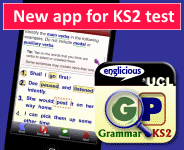Discourse markers
Discourse markers are usually short words, phrases or clauses that guide the way in which participants in a conversation interact with each other and how they react to each other's contributions. Here are some examples:
yeah, oh, well, ehr, uhm, ah, anyway, definitely, OK, absolutely, mmm, I mean, I think, so
Welcome back!

Englicious is totally free for everyone to use!
But you will have to log in to see our library of teaching resources.
If you don’t have an account, that’s perfectly OK. You can register (for free).
It only takes a minute or two.

